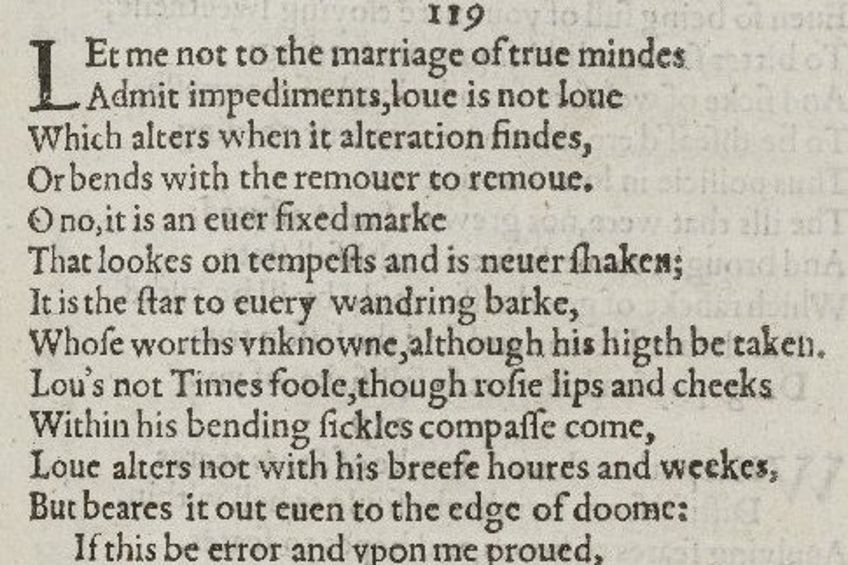Famous Shakespeare Poems – Explore the Best of the Bard
If anyone ever brings up the topic of classical poetry or plays, the first name that inevitably pops up is William Shakespeare. Regarded as arguably the best writer in history, William Shakespeare’s poetry is timeless and highly revered up to the present day. But, which poems by William Shakespeare are the most well-known today? Below, we will be revealing the meaning of the most famous Shakespeare poems ever written.
Contents
Understanding Famous Shakespeare Poems
While this accomplished English writer may be most well-known for his numerous plays, he is also known for having written some of the most renowned poems and sonnets in the history of the English language. It was in the 1590s that he began to publish his long poems and in 1609 he published his compilation of sonnets. But, who is the iconic figure behind William Shakespeare’s poetry? Let us start with a quick introduction to the famous writer.

The Man Behind William Shakespeare’s Poetry
| Name | William Shakespeare |
| Nationality | English |
| Date of Birth | 26 April 1564 |
| Date of Death | 23 April 1616 |
| Place of Birth | Stratford-upon-Avon, England, United Kingdom |
Born in Stratford-upon-Avon in England, Shakespeare is believed to have been schooled at King’s New School. He then married Anne Hathaway when he was 18 years of age and they had three children together. Not much is known about what Shakespeare did between the years 1585 and 1592, which has led historians to refer to this period as his “lost years”.
There are several theories as to what he was doing during this time, ranging from working as a school teacher to working in theaters, and even one rumor that he had fled due to poaching deer off of the land of a local squire.
It is not even known when Shakespeare first started writing his famous poems and plays, however, it is documented that some of his plays were being performed in London theaters by 1592. The plague caused all the theaters to be shut from 1593 to 1594 and during this period he started publishing poems such as The Rape of Lucrece and Venus and Adonis. The Sonnets are considered the last of his non-dramatic works to be printed and were published in 1609. Let’s explore a few of these famous examples of William Shakespeare’s poetry below.
Poems by William Shakespeare
Now that we know a little more about the great bard himself, we can examine the meaning of a few of his most notable poems. Almost all of his sonnets adhere to the same structure, and this is therefore known as Shakespearean Sonnet, not because he was necessarily the first to employ it, but due to the fact that he became its most renowned exponent. Let’s begin with the first sonnet he produced for his published series.
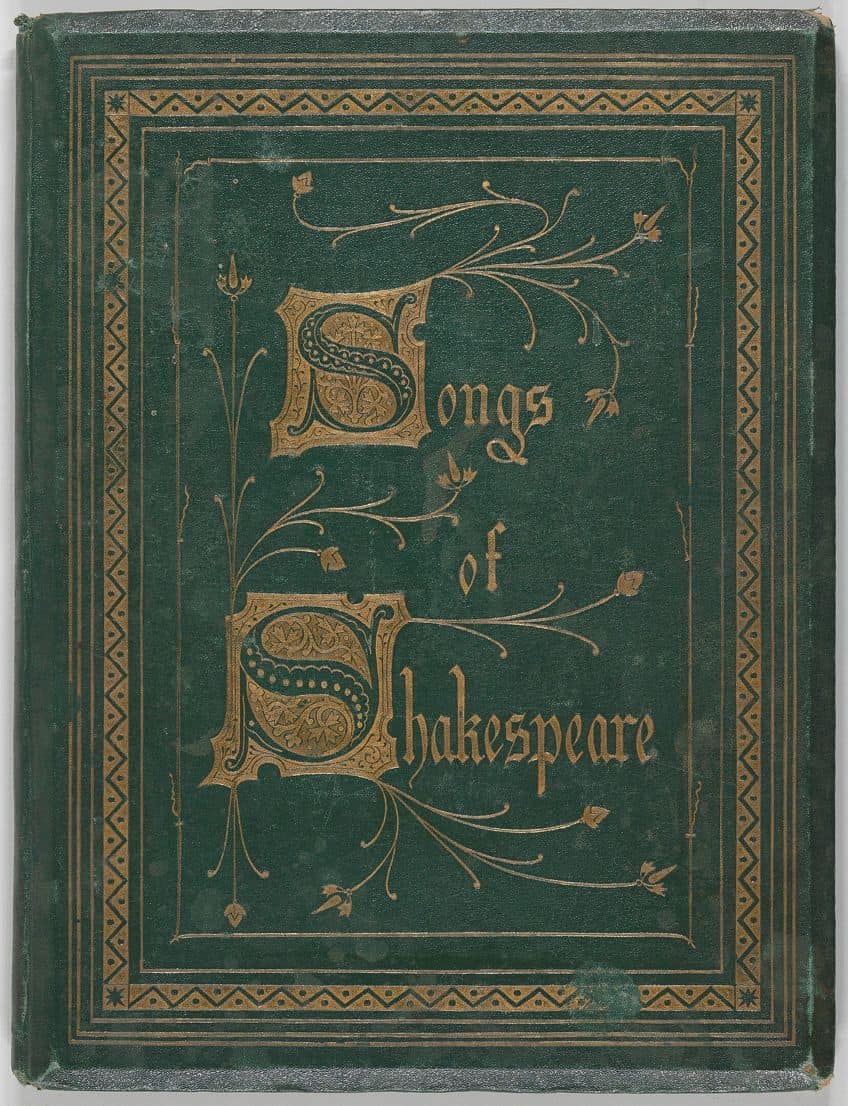
Sonnet 1
Sonnet 1 is the first of 154 sonnets penned by the famous English writer William Shakespeare and was initially published by Thomas Thorpe. Although 19th-century critics suspected Thorpe of publishing the poems by William Shakespeare without the author’s permission, present-day historians disagree and believe Thorpe maintained a respectable reputation. This sonnet serves as a sort of index to the rest of the sonnets in the collection, owing to the fact that it provides such an abundance of conceptual material; it appears to be a self-conscious foundation established for the rest of the works.
Some people may argue that William Shakespeare’s concept of beauty is simply skin deep, yet it is mentioned in the first two lines of this poem that all beauty fades and that even the prettiest of beings are no match for the inevitable passage of time.
Acknowledging that this type of beauty eventually fades away enables you to find a higher category of beauty: the ability to produce new beauty! This is the seed of the famous writer’s entire notion, which he develops throughout the sonnet series. Yet, he warns us, as well as the apparent person he is addressing, that being consumed with one’s own appearance blinds one to the objectively greater degree of beauty that lies ahead. Thus, we are confronted with the topic concerning our own mortality right from the start of the series.

Sonnet 17
The poet’s major objective in the early sonnets was to urge the lad to marry and perpetuate beauty through the production of a child but the intention shifts in this sonnet. In contrast to one’s concern with one’s own beauty as a fixed entity, the production of beauty represents a self-developing process – thereby evolving into the higher hypothesis of human existence. In this poem, the writer begs the youth to recognize that his writing can only take them so far. He had been developing his concept of beauty by means of poetry and now starts to refer to his idea of clearly expressing it in verse.
Yet, he questions his capacity to keep their beauty alive by means of verse alone and therefore encourages them to begin to take fate into their own hands.

Sonnet 18
Shakespeare employs the method of presenting a series of analogies, which appears in its inverted version in Sonnet 130, to illustrate how his Love is still beyond all sense of comparison in arguably the most renowned and certainly one of the most famous Shakespeare poems. In this regard, the only way to go further is to write something that transcends all concepts of beauty, immortalizing his love via his work, which manages to somehow capture what nothing else can.
It is undoubtedly regarded as one of the most beautiful sonnets because of its ideality, and its use of such subtle images to communicate such a profound feeling of beauty.
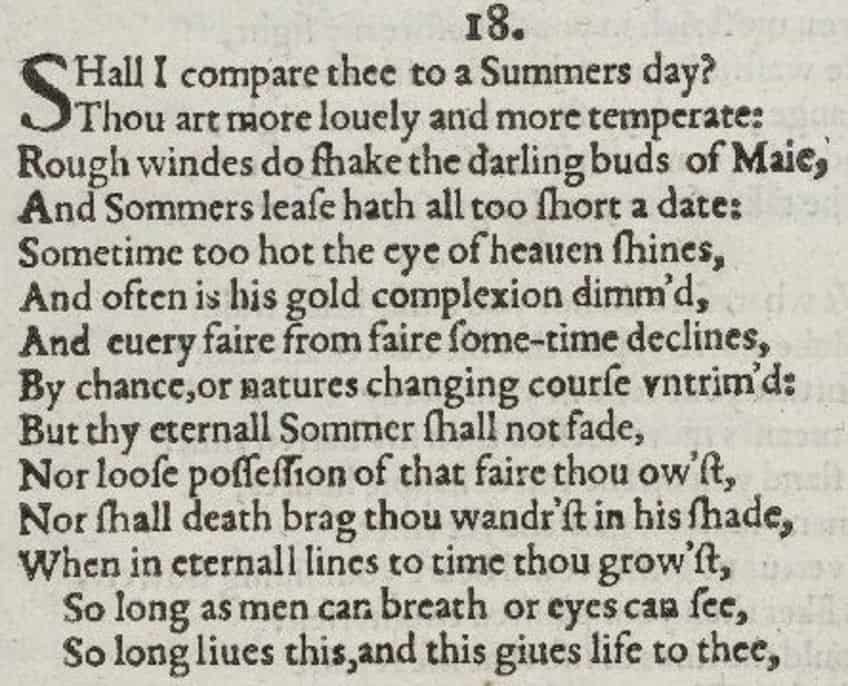
Sonnet 55
Shakespeare affirms the dominance of his poetic power in this sonnet as the power that resists all other forces – that which is everlasting. Of all the themes he can choose to compose poems about, he opts for love, and his poetry becomes the instrument through which he immortalizes his love. On a higher level, this displays the strength of love itself, of unselfish love, and of love for humanity, which is the driving force that propels one towards developing that which transcends all worldly challenges.
Regardless of the context of epic historical changes that surrounded him, William Shakespeare’s poetry engages in something greater, which those historical moments do not, because they lack a certain sense of creativity.
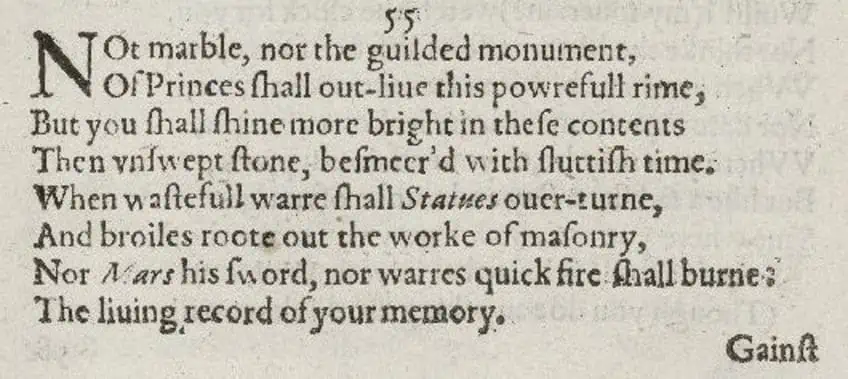
Sonnet 59
Shakespeare wonders how we know anything as lovely as his love hasn’t previously been written. He refers to the biblical allusion “there is nothing new under the sun”, causing a kind of crisis. Shakespeare stood at the threshold of a new Renaissance, in the shadows of the ancient Renaissance in Greece and the Golden Renaissance in Italy, whose sonetto form he appropriated and adapted to the English language.
He used the sonetto form to transmit an innovative new view of profound thoughts about man and nature.
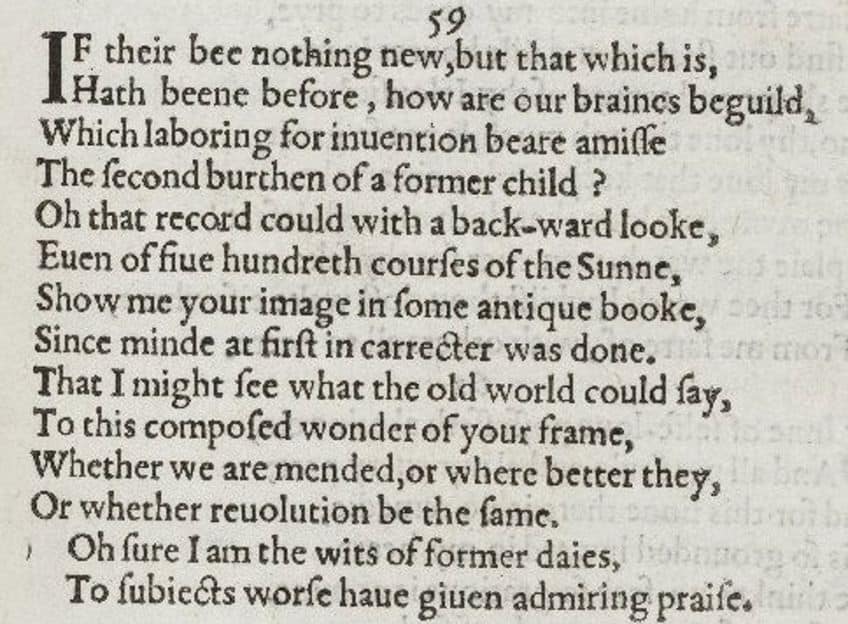
Sonnet 60
This sonnet seeks to describe the concept of time and how it affects human life. Here, Shakespeare affirms the supremacy of the artist, the creative intellect, and his power to develop something new in this passage. This becomes crucial in understanding Shakespeare’s recognition of his place in history, that after 500 courses of the sun, he is producing something fresh. Time is portrayed as a destructive beast in the third quatrain, ending youth and digging creases in the forehead of beauty.
In the couplet, he defends his verse against the ravages of time, claiming that it will endure and continue to celebrate the “worth” of those loved against the “cruel hand” of time.

Sonnet 65
The speaker opens the first four lines by reverting to the topic that he showed interest in over the previous two sonnets. Shakespeare once again addresses time and beauty. All of this is mentioned, as well as the Fair Youth and how the speaker’s connection with him would alter through time. He poses numerous concerns about who has the authority to protect against aging and the deterioration of beauty. It becomes evident that no one will be able to withstand the passage of time.
There is just one possibility: the writer maintains the appealing qualities of youth in his writing.

Sonnet 116
Numerous prominent Shakespeare readings have a propensity to get caught up in some of the romantic elements. The writer’s sense of subtlety and layered meaning, however appealing, was often utilized to hint at more than an obvious romantic theme. Despite this, this particular sonnet has become a genuine symbol of the marriage vow, typically being performed at weddings and considered as the ultimate proclamation of true affection. Shakespeare introduces the concept of love as a phenomenon that defies time and space.
Through real love, we acquire an unrivaled strength that can, in some ways, conquer all elements.
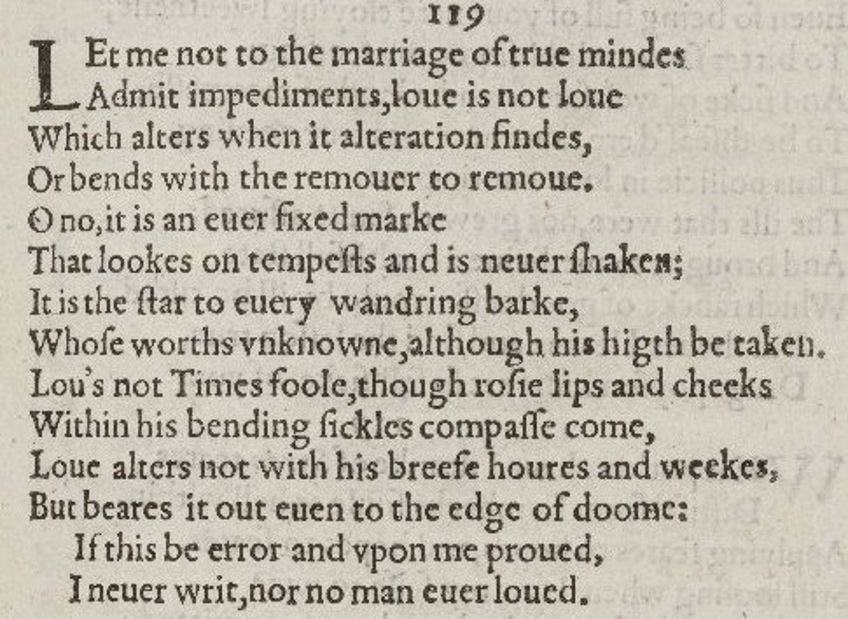
Sonnet 129
In this sonnet, Shakespeare considers the contrasting feelings of being infatuated with something beautiful, the experience of being fascinated by it, and the overwhelming desire to own it as if it were some item, some “object” we seek to possess. The lady he loves has chosen a different path in life, but he can’t seem to let go; he is torn inside between feelings of want, fear, and grief. He is revealing all of this with us as if it were an open book and by doing so, he is advising those reading to go past their immediate thoughts and feelings, no matter how noble they may appear.
Therefore, the conflict with sense perception, and the effort to overcome whatever overwhelming sense of power that our unfettered sensations may have, leads us to consider the mind and its role in our actual happiness.
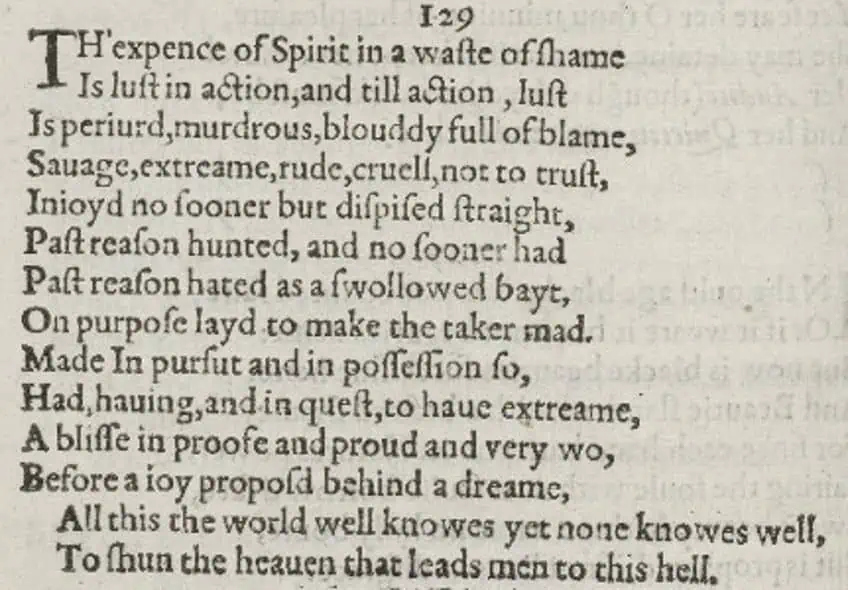
Sonnet 130
It was very common in classical poetry to use all different kinds of exaggerated analogies to describe a person’s love, such as the warmth of a beautiful summer’s day or the delicate beauty of a flower, essentially always using this as a means by which to proclaim their love exceeds any comparisons. By flipping this concept, the bard creates a metaphor that enables us to consider an entirely new dimension of the concept of beauty, one that goes beyond ordinary sense experience. Shakespeare goes above the temptation of many Romantic writers to just titillate our senses and delight in a thousand gorgeous visions of the beloved – his love is rooted in something far greater.
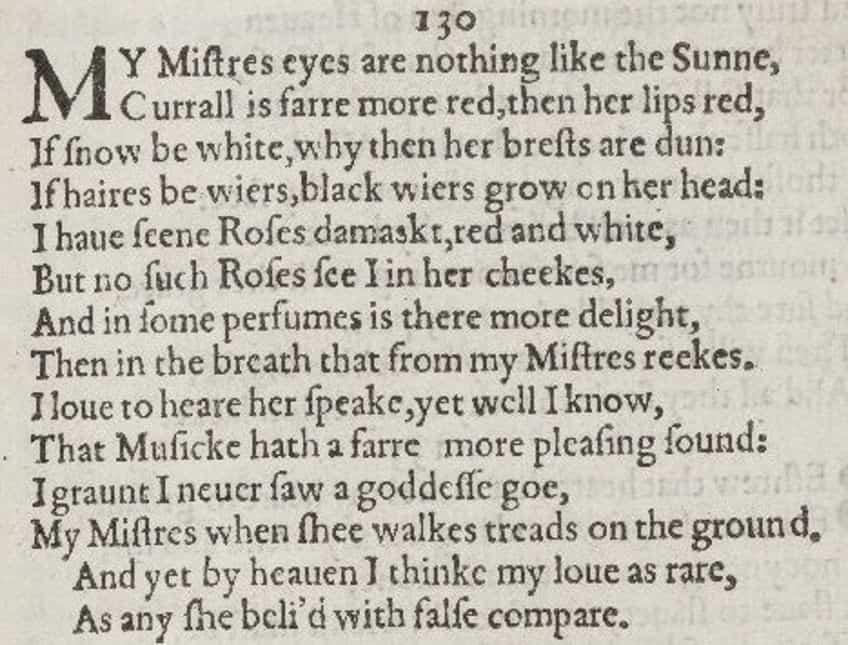
This concludes our look at famous Shakespeare poems. William Shakespeare should not be seen as a magnificent immortal being who towers above us all; rather, he is one of us, a mortal being. This acknowledgment of mortality is the heart of William Shakespeare’s poetry, the premise that underpins his rhymes. By understanding how he viewed topics such as beauty and death, we are able to see a bit of ourselves in this iconic figure of literature. This is why these poems by William Shakespeare continue to inspire people even up to the modern era – because the themes of love and loss, and life and mortality are all universally experienced by every one of us.
Frequently Asked Questions
What Themes Are Prominent in William Shakespeare’s Poetry?
Love is undoubtedly one of Shakespeare’s most prevalent topics. He also often muses about the passing of time and the fleeting essence of life and beauty. In several sonnets, he wrestles with the concept that time erodes everything, emphasizing the need to preserve beauty with his poetry. He felt that through his poems, a kind of immortality could be reached that manages to transcend time and death. His ability to portray the human experience in poetry has kept his works relevant and admired to this day.
Were William Shakespeare’s Poems Popular?
Yes, William Shakespeare’s poetry was well-known during his lifetime and is still highly valued and frequently read nowadays. Shakespeare received the patronage of powerful individuals, which helped in the promotion of his poetry. Unlike his plays, which were frequently performed in theaters and required live actors, Shakespeare’s poetry was freely accessible in written form, allowing a broader audience to connect with his work and ideas.
Liam Davis is an experienced art historian with demonstrated experience in the industry. After graduating from the Academy of Art History with a bachelor’s degree, Liam worked for many years as a copywriter for various art magazines and online art galleries. He also worked as an art curator for an art gallery in Illinois before working now as editor-in-chief for artfilemagazine.com. Liam’s passion is, aside from sculptures from the Roman and Greek periods, cave paintings, and neolithic art.
Learn more about Liam Davis and about us.
Cite this Article
Liam, Davis, “Famous Shakespeare Poems – Explore the Best of the Bard.” artfilemagazine – Your Online Art Source. September 22, 2023. URL: https://artfilemagazine.com/famous-shakespeare-poems/
Davis, L. (2023, 22 September). Famous Shakespeare Poems – Explore the Best of the Bard. artfilemagazine – Your Online Art Source. https://artfilemagazine.com/famous-shakespeare-poems/
Davis, Liam. “Famous Shakespeare Poems – Explore the Best of the Bard.” artfilemagazine – Your Online Art Source, September 22, 2023. https://artfilemagazine.com/famous-shakespeare-poems/.


